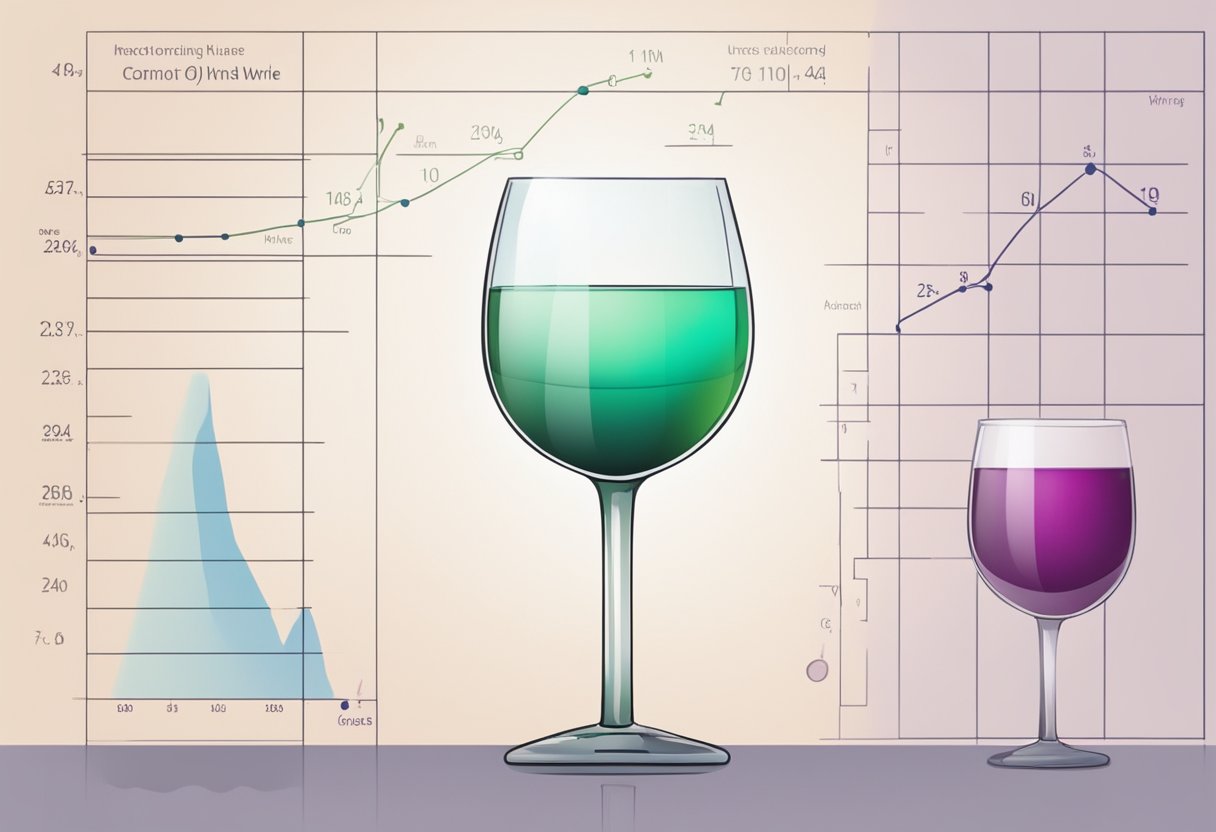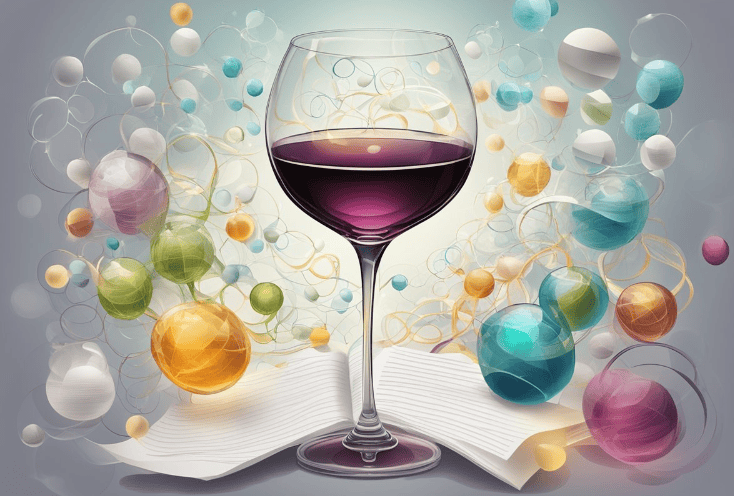Menopause marks a significant transition in a woman’s life. It’s often accompanied by a range of physical and emotional changes due to hormone fluctuations. Among the many lifestyle factors that can influence these menopausal symptoms, alcohol consumption is a topic of interest and concern.

While some women find that a glass of wine can help them relax, others report that alcohol exacerbates their symptoms. This suggests a complex relationship between alcohol and hormones during menopause.
The influence of alcohol on menopausal symptoms and hormonal balance is multi-faceted. Alcohol can affect sleep quality, mood, and the severity of hot flashes, which are common concerns during this period. Further, its impact on estrogen and other hormones can have both short and long-term effects on women’s health.
It’s important for women to understand these potential effects to make informed decisions about alcohol consumption during menopause.
In response to this need for clarity, emerging research aims to shed light on how alcohol interacts with the body during menopause. Guidelines for healthy consumption are being developed to support women in balancing enjoyment of life’s pleasures with mindful attention to their well-being. These guidelines aim to help women navigate the often confusing intersection of wine, hormonal health, and menopause with greater confidence and knowledge.
Understanding Menopause

Menopause is a significant phase in a woman’s life marked by the end of menstrual cycles. The process involves substantial hormonal shifts that can influence overall health and well-being.
Hormonal Changes and Symptoms
During menopause, a woman’s body experiences a decrease in the production of estrogen and progesterone, two key reproductive hormones. This decline can lead to various symptoms, including:
- Hot flashes: Sudden feelings of warmth, often accompanied by flushing and sweating.
- Mood swings: Emotional fluctuations that can range from irritability to periods of sadness.
- Sleep disturbances: Difficulty falling or staying asleep, often due to night sweats.
- Vaginal dryness: Decreased moisture production, which can cause discomfort.
Other symptoms might include weight gain, thinning hair, and dry skin. The intensity and duration of these symptoms can vary greatly among individuals.
Stages of Menopause
Menopause is not an abrupt change but a gradual process that typically occurs in three stages:
- Perimenopause
- It begins several years before menopause, often in a woman’s 40s.
- Ovaries start producing less estrogen and menstrual cycles may become irregular.
- Menopause
- It is diagnosed after 12 consecutive months without a menstrual period.
- Estrogen levels continue to drop.
- Postmenopause
- It commences after the menopause stage.
- Symptoms may ease for many women, but lower estrogen levels continue to affect health, possibly contributing to osteoporosis and heart disease.
Alcohol’s Influence on Hormones

Alcohol consumption can significantly affect hormonal balance, notably during menopause. Understanding these effects is crucial for maintaining health.
Biochemical Effects of Alcohol
When a person consumes alcohol, it impacts their central nervous system and alters the release of certain hormones. The body breaks down alcohol into acetaldehyde, a toxic substance that can disrupt endocrine system functioning. This disruption can lead to neuroendocrine changes such as:
- Reduced insulin sensitivity: which may affect glucose metabolism.
- Altered thyroid hormone levels: potentially affecting metabolism and energy levels.
Impact on Estrogen Levels
Alcohol can have a direct effect on estrogen levels, which are especially significant for women going through menopause. It can:
- Increase estrogen concentration: Moderate to high consumption of alcohol may cause a rise in circulating estrogen levels.
- Influence estrogen metabolism: It may alter how estrogen is metabolized in the liver, affecting overall hormone balance.
Drinking Guidelines for Menopausal Women

Menopausal women are advised to practice caution regarding alcohol consumption as it can affect hormone balance. Here are specific guidelines to help navigate alcohol use during menopause.
Moderation and Frequency
A woman going through menopause should ideally limit her alcohol intake to one drink per day. A standard drink is defined as:
- 12 ounces of beer (5% alcohol content)
- 5 ounces of wine (12% alcohol content)
- 1.5 ounces of distilled spirits (40% alcohol content)
Exceeding these amounts may exacerbate menopausal symptoms like hot flashes and night sweats. They also should be mindful of the frequency of their drinking sessions, ensuring there are several alcohol-free days each week to maintain hormonal balance and overall health.
Alcohol Alternatives
It’s beneficial for women to consider alcohol-free beverages, especially during menopause. Alternatives include:
- Sparkling water with a twist of lime or lemon
- Herbal teas which can have a calming effect
- Non-alcoholic wine or beer for those who enjoy the taste without the hormonal impact
Filling social time with drinks that don’t contain alcohol is a positive step toward managing menopause symptoms and keeping hormone levels as stable as possible.
Coping with Menopause Symptoms

Coping with symptoms of menopause involves a combination of lifestyle adjustments and stress management techniques. They can help balance hormones and mitigate symptoms such as hot flashes, mood swings, and sleep disturbances.
Lifestyle Adjustments
- Diet: Eating a balanced diet rich in fruits, vegetables, and whole grains can help. Incorporating foods with phytoestrogens, like soy, and maintaining a healthy weight are beneficial.
- Exercise: Regular physical activity improves overall health, boosts mood, and can reduce some menopause symptoms. Aim for at least 30 minutes of moderate exercise most days.
- Sleep: Establish a regular sleep routine to combat insomnia. Keep the bedroom cool to prevent night sweats and improve sleep quality.
Stress Management Techniques
- Relaxation: Activities like yoga or tai chi can reduce stress levels. Practicing deep breathing or meditation daily also helps in balancing hormones.
- Support: Joining a support group can provide emotional support and tips for coping. Therapy can be helpful for managing mood swings and anxiety.
Research and Perspectives

This section delves into the current understanding of how alcohol affects menopause symptoms and hormone balance, featuring insights from scientific studies and expert opinions.
Scientific Studies
Researchers have found that alcohol consumption can affect the hormonal balance in women, especially during menopause. A 2015 study published in Menopause, the journal of the North American Menopause Society, indicated that moderate alcohol intake may lead to a more favorable hormone balance, including lower levels of estradiol, a form of estrogen. However, the same study cautioned against higher levels of alcohol consumption, which could have the opposite effect on hormone levels.
Another significant study noted an increase in hot flashes and night sweats among menopausal women who consumed alcohol. Here’s a brief breakdown:
- Alcohol and Hot Flashes: Increased frequency in women who consume more than 3 drinks per week.
- Sleep Quality: Heavy drinking correlated with poorer sleep patterns among menopausal women.
- Bone Density: Alcohol’s impact on the estrogen can lead to lower bone density in postmenopausal women.
Expert Opinions
Health experts suggest moderation is key when it comes to alcohol consumption during menopause. They emphasize that light to moderate drinking might be acceptable for some women.
However, it’s important to consider individual health factors. For instance, Dr. Jane Doe, an endocrinologist specializing in hormonal health, advises:
- Moderation: Limiting to one standard drink per day.
- Type of Alcohol: Opting for wine over spirits could have different effects on hormone levels.
Nutritionists and menopause specialists agree that a personalized approach is crucial when offering guidelines for alcohol consumption during this life stage. They stress the importance of balancing the potential temporary relief some women may experience with the long-term effects on their overall health.

